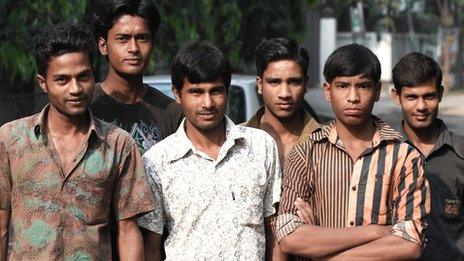What future awaits Bangladeshi youth?
- Published

The future of young Bangladeshis might not be as bleak as it has been portrayed
A recent forum organised by the Dhaka School of Economics and the Bangladesh Economic Association debated the motion: "Unemployment of educated youths is a major issue which needs to be addressed to avoid a social crisis."
That might sound alarming, but there is a strong entrepreneurial spirit in the country and not everyone believes the future looks so bleak.
Already the eighth most populous country in the world, the population of Bangladesh is forecast to reach 190 million by 2025, of which 43% will be under the age of 30, according to the US Census Bureau.
Prof Shamsul Alam, of the government's planning committee, told the forum 10 million jobs would be created under the five-year plan up to 2015, due to growth in manufacturing, construction and the service sectors.
But Bangladesh Rural Advancement Committee (BRAC) director Mahabub Hossain says that figure is overly ambitious.
He says 1.2 million jobs will be created each year, but that will be enough to cope with the number of people joining the workforce.
"Economic growth has historically been fuelled by the garment industry," he says.
"And that sector will continue to grow as China turns even more to low-cost sources such as Bangladesh."
Apart from that, however, the economy is also diversifying.
"There is rapid growth in leather manufacturing, the pharmaceutical industry is picking up, and there is a property boom," Mr Hossain says, adding the latter has seen a massive rise in the manufacture of bricks and cement.
"One-third of our workforce is finding employment overseas and that will be a another major source of job opportunities," he says, citing the need for manpower in the Middle East and China.
Uncertain future
But Mr Hossain's optimism is not universally shared.
Kamal Aware is worried about his prospects when he leaves college next year.
"My brother has a degree in engineering," he says.
"But the boss of one firm wanted him to pay the equivalent of a month's wage to get the job - money he doesn't have, and my parents can't afford it."
A professor at a university campus in the Dhaka suburb of Uttara, who wishes to remain anonymous, says he gets very disheartened knowing many of his students will leave with good qualifications but still find it hard to find work.
"Unless the government does more to create jobs, the country could witness scenes similar to those seen in Cairo's Tahrir Square, when young people demanded change," he says.
Corruption, nepotism and bureaucracy are often cited as the main stumbling blocks for an improved economy.
Abdur Razzaq, assistant secretary general of the Jamaat-e-Islami party, says: "Prospects for the young are unlikely to change until the judiciary and anti-corruption commission are totally independent from political interference."
The London-trained barrister adds that poor infrastructure and energy provision are also major hindrances to growth.
Meanwhile, Mr Hossain says that when firms have to use generators to supply their electricity, it increases the cost of production and decreases their competitiveness in the world market.
Living the dream
There are many who think young people should do more to help themselves, rather than relying upon the government to provide all the answers.

Khaled Ahmed's passion for photography has driven his ambition
Among them is Nobel laureate Muhammad Yunus. His Grameen organisation has helped educate thousands of people who now find themselves with a degree but without employment.
"Young people are without work, but there is a lot of work to be done," he says.
"People should wake up in the morning and say 'I am not a jobseeker, I am a job-creator.'"
Grameen has been instrumental in starting a nursing college in collaboration with Glasgow Caledonian University, and courses in auto-mechanics in conjunction with the Japanese company Autobach.
"These young men can then set up their own auto-repair shops and employ other people like themselves," Mr Yunus says.
Khaled Ahmed certainly didn't sit around waiting for someone to offer him a job.
When he left college he worked briefly for a telecoms company, but, after borrowing money from his father five years ago to purchase a good camera, he began taking wedding photographs.
"I was only an amateur when I began," he says. "But now I have my own company called Wedding Story and I employ seven people."
His ambition is to be a photojournalist, but meanwhile, as the only wage earner in his family, he is honing his skills.
"We only have three or four weddings a month, but with the photographs, filming and video editing, that is enough to keep us all fully employed," he says.
With a chuckle, he adds: "There will always be weddings, so our future is secure. But I will strive towards my dream until I become a photojournalist with an established agency."